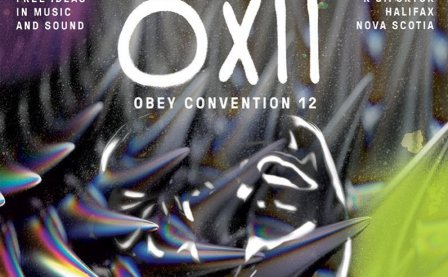A series of questions with no answers, words thrown at voids, 700 Bliss propose a music of and for survival. The poet-writer-rapper Moor Mother and DJ/producer DJ Haram have been playing with and for each other in Philadelphia’s noise scene for several years now, divulging the results of their collaboration intermittently. The decision to release this music now, accreting collaboration and improvisation into a bounded object, endows Spa 700 with a sense of timeliness, entangled with history, living in it, speaking to it; both of its time and for its time.
Sonically, 700 Bliss use the edifices and affects of contemporary regional club music — jersey kicks, breaking glass, sonorous bass — to conjure atmospheres and situations both earthly and cosmic: rain over moonlit oceans, dying fires in hollowed out cities, the frigid shimmer of stars. In its wrestling with history, this music becomes environmental as well as temporal; it stretches across pasts and futures, concerning itself with the topographical arrangements of objects in space and the sounds that echo between them. The figure of the ship (slave ship, spaceship, mothership) is important here — at once a location and a vessel — traversing space and time, throwing both into flux as it dislocates, rearranges, and destroys: “Look ma/we made it/only lost 100,000/coming over on them slave ships/and that’s just one ship.” Like the prow of the slave ship, this music sways, drags, and lifts: “Cosmic Slop’s” drums leaden and slurred, the vastness of the water surrounding it heavy, deep; “Ring The Alarm’s” elegiac grime chop strident and forceful, pushing upward and outward. Moor Mother acts as a magnetic presence throughout, arraying these sounds, spaces, and histories around her, drawing the listener into her words, her voice the carrier of pain, anger, and wry humor. Her verses are manifestos, expelled with force, their targets the multivalent, malevolent structures underpinning contemporary life, as pervasive as they are elusive: “That anti-black’s programmed in your head/ Now you want to steal my culture/ Ridicule my father.”
This attentiveness to that which both structures and recedes is most evident on “Ring the Alarm” and “Living,” which together form a tight theoretical pair, concerned as they are with what, following Elizabeth Povinelli, we might term the “quasi-event” — an occurrence whose boundaries are porous and whose effects dispersed. “Ring The Alarm” pivots around the designation of an emergency through an injunction, “Somebody come ring the alarm,” whose simplicity is undercut by an ontological, temporal, and metaphysical lack — Who is this “somebody”? When will they ring the alarm? And how can the spatio-temporality of an unfolded/unfolding structure like anti-blackness be captured by the singularity of this alarm — implying an individual moment of inception and, hypothetically, a point at which the emergency will reach an end and the alarm will no longer be needed. It is at this site of spatio-temporal instability that the music intrudes, its plosive kicks anchoring the deaths that surround it — figured by gunshots and shattered glass — creating an abstracted murder scene that repeats with each thump, an order disordered by the vagaries and violences of the ship and its hold on black life. Here, the event (of murder, anti-blackness, chattel slavery) is exploded, ascending to the plane of the structural, blown forward/backward into a repetitive form that, with its fingers, traces the shattered spine of history.
“Living” likewise works through an inferred negation, orbiting around questions whose answers feedback, gesturing away from the singular, toward the structural, the atmospheric, what following Christina Sharpe, we might call ‘the weather’: ‘How to survive when the world fall apart?’; ‘You know how many wars we’ve fought?’; ‘You know how many miles we walked?’ What kind of living is this? How is it bounded? Constrained? It is a living haunted by death, on a planet damaged by incarceration and slavery, one whose eerie spectrality is lodged deep in the grain of Moor Mother’s voice, the resonances of DJ Haram’s drums, and the fragile melodies that rise like embers from a fire, flickering on that liminal plane between being and nothingness.
But, and this is crucial, Spa 700 refuses empty nihilism. There’s too much propulsion, too much space to fill. Even at their bleakest — the wheezing moribundity that closes out “Cosmic Slop,” the hard brittleness of “Scully’s” jackhammer beats — these tracks remain entangled with, attentive to the pleasures and possibilities of dance music. The easy tactility in the interplay between vocals and beats animates this music as it converges with and diverges from the club, the ship, history. And even if Moor Mother’s questions are unanswerable, having no singular recipient, in the provocation of their posing, 700 Bliss point to the constitutive absences that produce them, “I just want to make it clear”, as “Sully” has it; a making clear that finds its form in the tracing of an absence that is not a nihilism, nor a pessimism, but a pragmatism, what Donna Haraway calls “staying with the trouble,” moving through the storm, a movement that is ongoing, that does not end. “Sully” finishes in this mode of non-ending, as Moor Mother inhales, preparing to utter more syllables, words, voices, stories. In this space between breath and utterance, ending is elided, replaced by process, an unfolding, as the album’s sonic objects, topographies, and affects disperse, persisting, troubling, refusing. There’s always more to be said.
More about: 700 Bliss, DJ Haram, Moor Mother




